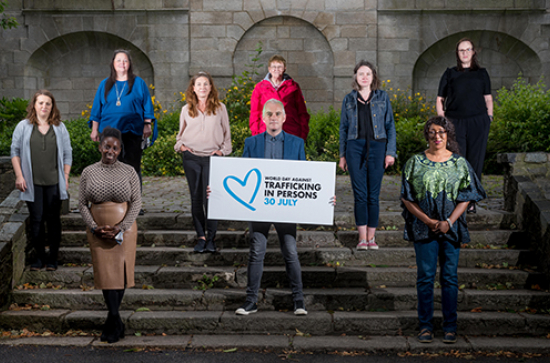
To mark World Day Against Trafficking in Persons 2021, on July 30th, representatives from organisations working to counter trafficking in persons joined forces to take a stand against trafficking in persons.
Dr Niamh Flanagan, Coordinator of the taught module on Anti Human Trafficking at Maynooth University joined MECPATHS (Mercy Efforts for Child Protection against Trafficking with the Hospitality and Services Sectors), The Immigrant Council of Ireland, The Migrants Rights Centre Ireland, Ruhama, Act to Prevent Trafficking, Akidwa and The International Organisation for Migration to issue a collaborative call for an improved prevention, policy and practice response in Ireland.
The Anti-Trafficking Community in Ireland recognises that child trafficking, human trafficking and modern-day slavery require a cohesive response and continues to raise awareness and concerns about the country’s preventative practices. The placement of Ireland on a Tier 2 ‘Watch-list’ by The US State Department categorises Ireland as ‘the worst country in Western Europe’ in relation to Anti Human Trafficking responsiveness. The US report says “The Government of Ireland does not fully meet the minimum standards for the elimination of trafficking but is making significant efforts to do so.” The Irish Human Rights and Equality Commission, in its capacity as Ireland’s Independent National Rapporteur on the Trafficking of Human Beings has indicated the need for a new national action plan with clear national commitments.
Over the past three years social policy and social work educators from the Department of Applied Social Studies have worked with education partners from the Department of Law (MU), social justice NGO, MECPATHS, and the Former Head of An Garda Siochana’s Human Trafficking Unit to develop a comprehensive taught module to introduce students to the policy, practice perspectives and debates about Human Trafficking. Situated within the Masters in Social Science (Rights and Social Policy), from this year the module will be available to postgrad students of law, international justice, criminology, gender, diversity and inclusion. If the national response to the issue of trafficking in persons is to improve, it is vital that practitioners, advocates, law-makers and policy-makers of the future are informed, educated and inspired to implement a social justice response to this issue.
